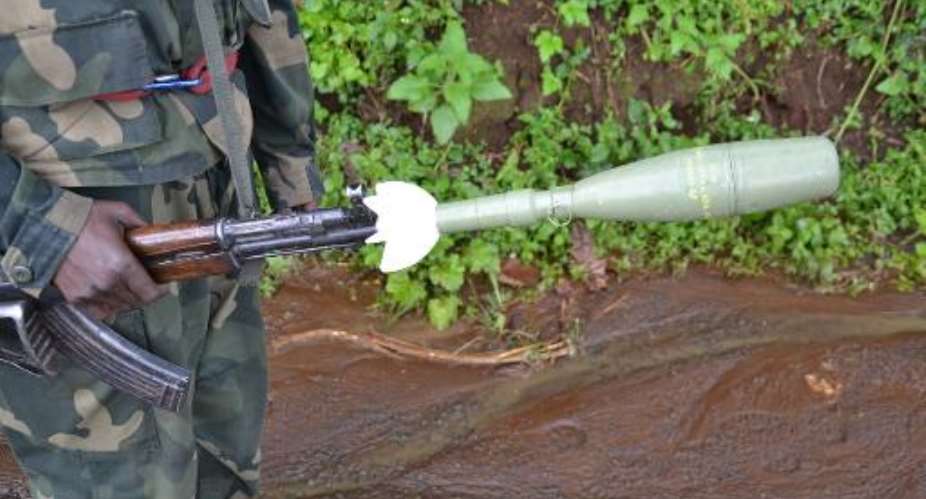Kinshasa (AFP) - Former rebels beaten last November by government and UN troops in the Democratic Republic of Congo on Monday accused the army of executing 10 prisoners of war.
"We are completely distressed, stunned, frustrated" to learn of "the summary execution of the prisoners of war by the DRC's military intelligence service in Kinshasa ... between the months of July and August 2014," political chief, Bertrand Bisimwa, of the Movement of March 23 (M23) said in a statement.
The government has denied the allegation.
The M23 statement listed 10 victims said to be former members of the National Congress for the Defence of the People (CNDP), a largely ethnic Tutsi rebel movement that signed a peace deal with the government on March 23, 2009.
Like other rebel forces in the strife-wracked North Kivu province, ex-CNDP forces were integrated into the army, but these fighters protested that other aspects of the peace accord were not implemented by the Kinshasa government. In May 2012, they mutinied and formed M23.
Bisimwa charged that the 10 former CNDP members were among "about 100 military men" arrested in North Kivu "between May 2012 and August 2013 on the simple suspicion of belonging" to M23. Before their deaths, they suffered "atrocious torture and degrading treatment" in "the dungeons ... of the military intelligence services", he said.
Government spokesman Lambert Mende "totally" denied the allegations to AFP, saying that "we no longer execute people in the Congo".
"If members of the government or the army have committed reprehensible acts, military and civilian justice is available," Mende added.
However, M23 has turned instead for help to the International Conference on the Great Lakes Region (ICGLR) and the Southern African Development Comunity (SADC), which are both large groupings of countries active in bids to settle the crisis between Kinshasa and the ex-rebels.
On August 11, the movement protested that "only ... 31 members of M23" have been officially amnestied by President Joseph Kabila's regime, though 3,657 ex-rebels signed a commitment not to take up arms again.
M23 added that "dozens" of former fighters had been arrested on their return from abroad despite signing the undertaking. United Nations experts charge that during its insurgency, M23 was backed by neighbouring Rwanda and Uganda.
In the wake of the movement's defeat and peace agreements made last December, lawmakers in February passed a law granting amnesty for acts of insurgency, acts of war, and political offenses.
The legislation specifically excluded amnesty for genocide, crimes against humanity and war crimes.





 Paramount Chief of Gwollu dead
Paramount Chief of Gwollu dead
 TUC tells informal sector employers to pay their employees the minimum wage
TUC tells informal sector employers to pay their employees the minimum wage
 Prof. Marfo urges good civilian-security relations to promote peace
Prof. Marfo urges good civilian-security relations to promote peace
 I was nearly jailed because of NPP; I’m still ‘pained’ — Hopeson Adorye
I was nearly jailed because of NPP; I’m still ‘pained’ — Hopeson Adorye
 Rising against NPP after being a minister for 15 years is a sin; God will judge ...
Rising against NPP after being a minister for 15 years is a sin; God will judge ...
 Cecilia Dapaah: Reasons behind AG’s advice to EOCO not grounded in law – Martin ...
Cecilia Dapaah: Reasons behind AG’s advice to EOCO not grounded in law – Martin ...
 NPP should have reported Kingsley Nyarko’s conduct to police – Inusah Fuseini
NPP should have reported Kingsley Nyarko’s conduct to police – Inusah Fuseini
 Akufo-Addo cuts sod for MIIF Technical Training Centre
Akufo-Addo cuts sod for MIIF Technical Training Centre
 NPP didn’t struggle to win Ejisu by-election – Samuel Ayeh-Paye
NPP didn’t struggle to win Ejisu by-election – Samuel Ayeh-Paye
 Naa Ayemoede returns to school
Naa Ayemoede returns to school
